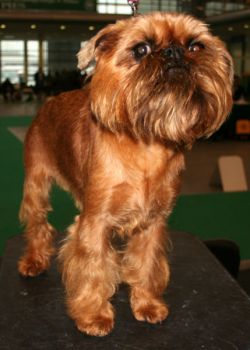
Brussels Griffon
Veterinarian Reviewed on December 22, 2007 by Dr. Janice Huntingford
Physical Characteristics
Breed Group:
Toy group.
Weight:
Between 6-12 pounds.
Height:
Between 7-8 inches at the shoulders.
Color(s):
Standard colors include black and tan, rusty red, and solid black.
Coat:
Brussels Griffons have a harsh, wiry outer coat and a soft, short undercoat.
Overview
Character:
Brussels Griffons are exuberant and intelligent. These dogs also have big hearts and are affectionate toward their owners.
Country of Origin:
Belgium.
History:
Brussels Griffons were created in Belgium during the nineteenth century, likely through the crossing of Affenpinschers with several other toy breeds. Originally, these dogs were used to catch rats on farms but now they are mostly used as watchdogs and companions. Brussels Griffons first appeared in England during the 1880’s and soon after began to spread around the world.
Name:
Additional names include Griffon Belge, Griffon Bruxellois, and Belgium Griffon.
Temperament:
Brussels Griffons are independent and quite stubborn. Alert and inquisitive, Griffons will often try to dominate larger dogs, although they usually back down in the end. Brussels Griffons tend to bond with one person rather than a family.
Care
Training:
While intelligent, Belgium Griffons are quite stubborn and can be difficult to train. Due to their sensitive nature, they require careful socialization at a young age.
Activity:
Griffons are active dogs with an exuberant spirit. They require plenty of exercise and can become overexcited quite easily.
Ownership:
Belgium Griffons are not ideal companions for children. Griffons are generally one-person dogs and like to spend lots of time with their owner. For this reason, these dogs don’t like to be left outdoors for long stretches of time. This breed requires special care for its teeth.
Breeders
No breeders listed at this time.
Sign up for our newsletter and receive more articles and the latest pet health updates and special offers.
Our Expert
 Dr. Janice Huntingford
Dr. Janice HuntingfordJanice Huntingford, DVM, has been in veterinary practice for over 30 years and has founded two veterinary clinics since receiving her Doctor of Veterinary Medicine at the Ontario Veterinary College, University of Guelph. She has studied extensively in both conventional and holistic modalities. Ask Dr. Jan

